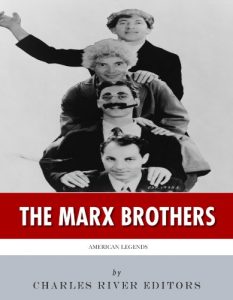*Includes pictures.
*Includes the brothers' funniest quotes.
*Includes a bibliography for further reading.
*Includes a table of contents.
"The world would not be in such a snarl, had Marx been Groucho instead of Karl." – Irving Berlin
“I sent the club a wire stating, ‘PLEASE ACCEPT MY RESIGNATION. I DON'T WANT TO BELONG TO ANY CLUB THAT WILL ACCEPT PEOPLE LIKE ME AS A MEMBER.’” – Groucho Marx
A lot of ink has been spilled covering the lives of history’s most influential figures, but how much of the forest is lost for the trees? In Charles River Editors’ American Legends series, readers can get caught up to speed on the lives of America’s most important men and women in the time it takes to finish a commute, while learning interesting facts long forgotten or never known.
When the American Film Institute ranked its top 50 screen legends of the 20th century, only one team of performers earned a collective spot: the Marx Brothers. Famous throughout the country for nearly half a century, several of the Marx Brothers performed together for over 40 years, and their nicknames – Groucho, Harpo, Chico, Gummo and Zeppo – are all well known today, especially Groucho. From the vaudeville stage to movie theaters, millions saw their performances, and the brothers became not only one of the most popular acts but the kind that paved the way for subsequent groups like The Three Stooges.
As beloved and culturally significant as the Marx Brothers are, it is also important to acknowledge that the character they portrayed in their films were clearly personas, so one of the challenges of any close analysis of their lives involves digging past their performances and attempting to figure out what they were truly like as people. How much did the Groucho Marx audiences saw onscreen correspond with his offscreen personality, and where are the nuances and discrepancies that exist between the brothers’ private and public selves? If anything, it’s important to determine how their personas were actually shaped, a process that did not actually crystallize until Groucho was well into his adulthood. At the same time, the dynamic between the siblings, as well as the impact that their parents had on them, all necessarily influenced their careers. Analyzing these influences on their lives helps explain how the formation of the Marx Brothers was the result of a lengthy process, and just why no one could have justifiably predicted that they would achieve such fame and cultural status.
American Legends: The Marx Brothers examines the lives and careers of one of America’s most iconic performance teams. Along with pictures of important people, places, and events, you will learn about the Marx Brothers like never before, in no time at all.
*Includes the brothers' funniest quotes.
*Includes a bibliography for further reading.
*Includes a table of contents.
"The world would not be in such a snarl, had Marx been Groucho instead of Karl." – Irving Berlin
“I sent the club a wire stating, ‘PLEASE ACCEPT MY RESIGNATION. I DON'T WANT TO BELONG TO ANY CLUB THAT WILL ACCEPT PEOPLE LIKE ME AS A MEMBER.’” – Groucho Marx
A lot of ink has been spilled covering the lives of history’s most influential figures, but how much of the forest is lost for the trees? In Charles River Editors’ American Legends series, readers can get caught up to speed on the lives of America’s most important men and women in the time it takes to finish a commute, while learning interesting facts long forgotten or never known.
When the American Film Institute ranked its top 50 screen legends of the 20th century, only one team of performers earned a collective spot: the Marx Brothers. Famous throughout the country for nearly half a century, several of the Marx Brothers performed together for over 40 years, and their nicknames – Groucho, Harpo, Chico, Gummo and Zeppo – are all well known today, especially Groucho. From the vaudeville stage to movie theaters, millions saw their performances, and the brothers became not only one of the most popular acts but the kind that paved the way for subsequent groups like The Three Stooges.
As beloved and culturally significant as the Marx Brothers are, it is also important to acknowledge that the character they portrayed in their films were clearly personas, so one of the challenges of any close analysis of their lives involves digging past their performances and attempting to figure out what they were truly like as people. How much did the Groucho Marx audiences saw onscreen correspond with his offscreen personality, and where are the nuances and discrepancies that exist between the brothers’ private and public selves? If anything, it’s important to determine how their personas were actually shaped, a process that did not actually crystallize until Groucho was well into his adulthood. At the same time, the dynamic between the siblings, as well as the impact that their parents had on them, all necessarily influenced their careers. Analyzing these influences on their lives helps explain how the formation of the Marx Brothers was the result of a lengthy process, and just why no one could have justifiably predicted that they would achieve such fame and cultural status.
American Legends: The Marx Brothers examines the lives and careers of one of America’s most iconic performance teams. Along with pictures of important people, places, and events, you will learn about the Marx Brothers like never before, in no time at all.






